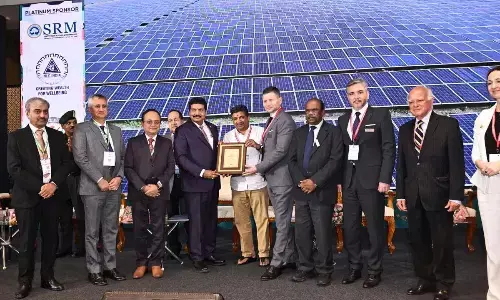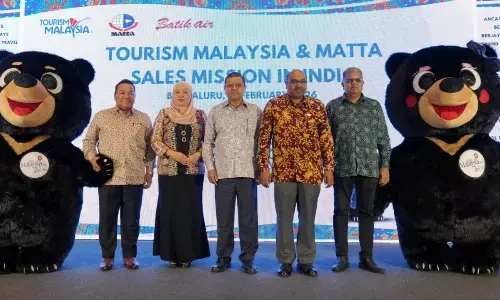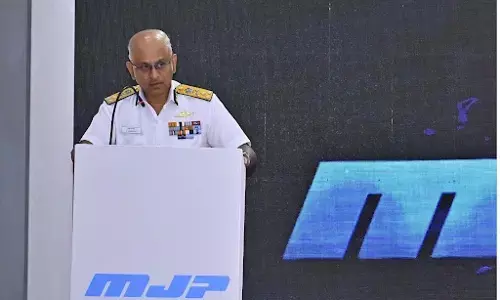Vitamin 'D' deficiency in women getting common these days

Vitamin 'D' deficiency in women getting common these days
Federation of Obstetric and Gynaecological Societies of India (FOGSI) in collaboration with PULSE Pharmaceuticals has taken major initiative to bridge the Vitamin 'D' deficit in the Indian women.
Federation of Obstetric and Gynaecological Societies of India (FOGSI) in collaboration with PULSE Pharmaceuticals has taken major initiative to bridge the Vitamin 'D' deficit in the Indian women. Dr Shantakumari, President, Federation of Obstetric and Gynecological Societies of India and Rambabu, Managing Director, Pulse Pharmaceuticals; speaking at a press conference here, announced a joint campaign to create awareness on Vitamin 'D' sufficiency levels across various indications in Women's health, through generation of scientific practice points around the therapy.
Increasingly women's health is emerging as a grave concern in India. Women's well-being and immunity levels are vital for their overall robust health. However, one of the major indicators off late for the deterioration in women health, is Vitamin 'D' deficiency. This deficiency is usually non symptomatic though found to be extremely common. Incidentally some studies in the past decade reported a prevalence of 50% to 94% across age groups and such prevalence was seen throughout the country. The deficiency is often discovered while undergoing treatment for other ailments and in certain instances too late for corrective treatment.
Highest priority needs to be accorded to create awareness on this silent ailment. Limiting to patients alone will not help, even the medical fraternity has to be roped in to combat the Vitamin 'D' deficiency issue. The apt way to build awareness and set a momentum in the doctors' community is through Scientific discussions across indications through the times of Gynaecology platform, says Dr Shantakumari. I am the President of FOGSI and the first person to hold this post from Andhra Pradesh and Telangana. FOGSI has 38000 gynaecologists with 262 societies spread across India. I am trustee of FIGO, the international Federation of Gynaecology and Obstetrics, which is in 132 countries globally.
In the past two years, COVID has taught us how it's very important for us to be healthy. What is needed is a healthy body, physically and mentally. Having a strong immunity is critical. We need to invest on the health of people, be it women or men. Unfortunately we see very high deficiency of micro and macro nutrients in women, one of the common problems is anaemia, though the prevalence of 80% to 90% has come down but still an estimated 50% of the population is suffering from anaemia. In our country the burning problem is iron deficiency anaemia, besides micro and macro nutrients. Nutrient deficiency is the cause for all problems in our country. The reason for this nutrition deficiency is the food we consume, it doesn't have proper nutrients needed for the body. The lifestyle we lead is also not letting us get everything needed for a healthy being.
It could be the pesticides used to grow crops, unhealthy lifestyle changes, environmental factors are all affecting the micro and macro nutrients necessities of the body and those could be the most important reasons why we are having all the problems of Nutrient deficiency. Off late there is lot of talk of vitamin D deficiency, we never thought it could be an issue in our tropical country with the kind of exposure to sun in we have a few decades ago and we thought we Indians are fortunate because of our climate and lifestyle.
But over the years things have changed, we have changed from what we were to aping the other cultures. We adopted various alien habits and forgot our original habits, we stopped cooking in iron vessels, doing physical exercise, Surya namaskar etc., because we thought our practices were primitive and those alien practices were the apt practices. Suddenly in the last decade we realised we have become vitamin D deficient. This vitamin D deficiency is affecting lot of our metabolic process and several were being afflicted of diabetes, today Hyderabad is the Diabetic capital of India. The vitamin D deficiency is contributing to muscle and bone pain in women.
Few years ago we never used to check vitamin D deficiencies, but suddenly we were finding lot of deficiencies when we did tests for vitamin D, which in turn is contributing to lot of problems. We are seeing so many cases of kidney failures, dialysis, bone pain, muscle pain etc. People are taking nonsteroidal anti-inflammatory drugs to get relief from pain. The pain is a symptom of vitamin D deficiency, instead of addressing it through nutrients we are only pushing the pain killers leading to further problems. Women's health has to be taken care from the adolescent age through the growing ages, because once the bone and muscle strength are taken care by both physical activity and adequate diet, the side effects when the woman becomes pregnant or grows older will be much lesser. Pain killer is not the answer for pain, the root cause has to be detected and addressed, which will lead to a holistic health and a healthier life. Vitamin D enhances immunity, with stronger immunity we fair better even with diseases like COVID.
The three most common symptoms of vitamin 'D' deficiency are persistent fatigue where the person gets tired very easily and also feel tired all the time, bone, joint and muscle pains, body aches, low backache and last but not least, recurrent infections due to low immunity. In fact COVID infection is seen more often in patients with Vitamin 'D' deficiency.
Some of the causes that contribute to Vitamin 'D' deficiency are increased indoor lifestyle and lesser exposure to sun in Urban lifestyle. Unspaced and unplanned pregnancies in women with dietary deficits lead to worsening status of Vitamin 'D' in both the mother and child.
In India, Vitamin 'D' deficiency is wide spread and currently the diagnosed numbers are only tip of the iceberg. Educational programs are a must to create awareness along with testing facilities for early detection and initiating corrective care, says Mr Rambabu. Earlier because of the demands of life we used to do lot of physical activity, that way got adequate vitamin D and slept early as it became pitch dark when there was no electric power, this made us healthy. But today we are doing exactly opposite, we are awake till late night and wake up late, travelling to offices with no exposure to sun, we are also fully covered. Current lifestyle has contributed to this problem of vitamin D deficiency to a great extent.
The kind of supplements we have in the market are not good enough to solve this problem. Our bodies are not made to absorb vitamin D through the gut, it is supposed to be synthesized through the skin. Even most of our foods don't contain much of vitamin D. We have to take supplements which work on us, that is where PULSE pharmaceuticals comes into the picture, we understand the science and developed suitable formulations after extensive research, by using drug delivery technology like Nano pharmaceutical technology, we make the necessary micronutrients.
We also felt it's our responsibility to build public and patient awareness, by partnering with a responsible organization like FOGSI and reach out the message to patients. The fortified foods available in the market will be much lesser may not help so much in India as our cooking methods of boiling and frying don't go with fortified foods unlike in the western world. The Micronutrients are heat sensitives, that is one of the challenges we face here. That's where we come into the picture to overcome these very challenges to make our bodies absorb supplements.











